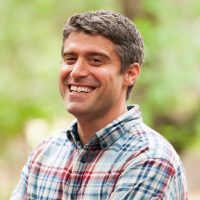Winter Quarter 2024 Newsletter
Updates From the Team at Nature and Health
There’s something about the start of a new year that can bring in a breath of fresh air. It gives us all a moment to pause and think about where we’ve been and where we’re going. At Nature and Health, we’re excited to share some updates that have us feeling reinvigorated in the new year.
 Welcome our New Director, Gregory Bratman
Welcome our New Director, Gregory Bratman
Gregory Bratman has stepped up to become our new director. He is also the director of the Environment and Well-Being Lab, a Senior JPB Harvard Environmental Health Fellow, and the Doug Walker Endowed Professor . While Gregory is new in this role, he has served on our Steering Committee since its inception and has been a Nature and Health researcher for nearly 15 years, co-authoring over 40 publications and reports to date. We extend our immense gratitude to outgoing Director, Josh Lawler, for establishing Nature and Health and his pioneering work in the field. Josh will remain integrally involved as our associate director and a member of our Steering Committee.
Check out our New Mission and Vision
In 2014, Nature and Health began as a collaboration of researchers, healthcare providers, community organizations, outdoor schools, the outdoor gear industry, and local, state, and federal agencies who wanted to understand how time in nature affected human well-being. Now that we better understand these benefits, we want to ensure that everyone has equitable opportunities to engage with nature. We’ve updated our mission and vision to reflect our evolving focus.
Meet our Researchers
From proposing solutions to help address health inequities to examining different types of nature interactions, our research spans many disciplines, communities, and methodologies. Visit our new Researcher webpage to learn about the people behind Nature and Health’s groundbreaking research.
Latest Research
A Text-Messaging Chatbot to Support Outdoor Recreation Monitoring Through Community Science
Public land managers depend on reliable and readily available data about outdoor recreation in parks and greenspaces. However, traditional recreation monitoring techniques including visitor surveying and counting cannot be implemented over large spatial and temporal scales, especially in remote and undeveloped settings where monitoring is costly. To fill these data gaps, and thereby inform decision-making, this study develops and tests the efficacy of a novel recreation monitoring technique that engages visitors in data collection using a chatbot and text-messages.
All Systems are Interrelated: Multilevel Interventions with Indigenous Communities
Colonial historical trauma and ongoing structural racism have impacted Indigenous peoples for generations and explain the ongoing health disparities. However, Indigenous peoples have been engaging in multilevel, clinical trial interventions with Indigenous and allied research scientists resulting in promising success. In this paper, National Institutes of Health funded scientists in the field of Indigenous health have sought to describe the utility and need for multilevel interventions across Indigenous communities.
Applying an Ecosystem Services Framework on Nature and Mental Health to Recreational Blue Space Visits Across 18 Countries
The effects of nature on mental health and subjective well-being have yet to be consistently integrated into ecosystem service models and frameworks. To address this gap, researchers used data on subjective mental well-being from an 18-country survey to test a conceptual model integrating mental health with ecosystem services. The study found that subjective mental well-being outcomes were dependent upon a complex interplay of environmental type and quality, visit characteristics, and individual factors.
Upcoming Events
January 31, 2024 Community Dinner with Edmund Seto, PhD
Our quarterly dinners bring together researchers, educators, healthcare providers, policymakers, and community organizations to learn about the latest nature and health research and to find innovative ways to collaborate on research, inform policies, and implement programs. During our January dinner, Edmund Seto will discuss his research on healthcare inequities. Dinner and drinks will be provided. Registration is required.
May 1, 2024 Nature and Health Symposium – Save the Date!
Please save the date for our 2024 Nature and Health symposium on May 1 at the wǝɫǝbʔaltxʷ – Intellectual House in Seattle. More details to come in early February. Bookmark the symposium landing page, sign up for our listserv, and join us on Facebook and Instagram to receive updates.
 Act
Act
Help Pass the Outdoors for All Act
Ask Congress to pass the Outdoors for All Act, which seeks to close the nature gap by making a program called the Outdoor Recreation Legacy Partnership Program permanent law, securing funding for green spaces in underserved communities.
Resources
Self-Guided Forest Bathing
How do you relax and recharge? You are invited to learn and practice forest bathing, a nature immersion activity that has been shown to increase health and well-being. To get started, check out the handout or follow along with the audio guide, courtesy of UW Botanic Gardens.
UW Campus Nature
There are many different ways people interact with nature, and it can happen on various scales. UW Sustainability has put together some resources to help the UW community connect with nature, whether that means taking a quick break on campus or getting away from the urban environment for a hike or other activity.
 Join Our Community
Join Our Community
We invite you to join our different channels to learn more about the Nature and Health movement and to connect with others in the field.
- Opt into our newsletter
- Sign up for our listserv
- Join us on Facebook, Instagram, and LinkedIn
Interested in collaborating with us? Let us know at natureandhealth@uw.edu!
Support Our Work
Nature and Health’s cross-cutting research and policy engagement improves the lives of our communities. With your support, we can better understand how nature affects human health, how to best leverage these benefits, and how to implement policies that make nature more accessible to all communities.
Contributions of any size will help sustain our cutting-edge research, our community-building efforts, recognize equitable leaders in the field of nature and health, and support the next generation of researchers.